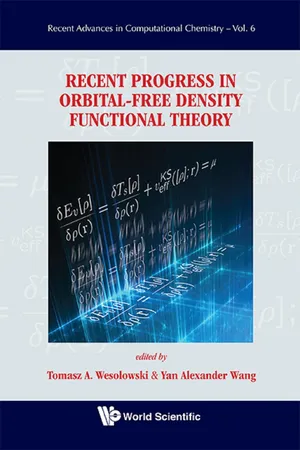
Recent Progress In Orbital-free Density Functional Theory
- 464 pages
- English
- ePUB (mobile friendly)
- Available on iOS & Android
Recent Progress In Orbital-free Density Functional Theory
About this book
This is a comprehensive overview of state-of-the-art computational methods based on orbital-free formulation of density functional theory completed by the most recent developments concerning the exact properties, approximations, and interpretations of the relevant quantities in density functional theory.
The book is a compilation of contributions stemming from a series of workshops which had been taking place since 2002. It not only chronicles many of the latest developments but also summarises some of the more significant ones. The chapters are mainly reviews of sub-domains but also include original research.
Contents:
- Part 1: Density Functional for the Kinetic Energy and Its Applications in Orbital-Free DFT Simulations:
- From the Hohenberg-Kohn Theory to the Kohn-Sham Equations (Y A Wang & P Xiang)
- Accurate Computation of the Non-Interacting Kinetic Energy from Electron Densities (F A Bulat & W Yang)
- The Single-Particle Kinetic Energy of Many-Fermion Systems: Transcending the Thomas-Fermi plus Von Weizsäcker Method (G G N Angilella & N H March)
- An Orbital Free ab initio Method: Applications to Liquid Metals and Clusters (A Aguado, D J González, L E González, J M López, S Núñez & M J Stott)
- Electronic Structure Calculations at Macroscopic Scales Using Orbital-Free DFT (B G Radhakrishnan & V Gavini)
- Properties of Hot and Dense Matter by Orbital-Free Molecular Dynamics (F Lambert, J Clérouin, J-F Danel, L Kazandjian & S Mazevet)
- Shell-Correction and Orbital-Free Density-Functional Methods for Finite Systems (C Yannouleas & U Landman)
- Finite Element Approximations in Orbital-Free Density Functional Theory (H Chen & A Zhou)
- Part 2: The Functional for the Non-Additive Kinetic Energy and Its Applications in Numerical Simulations:
- Non-Additive Kinetic Energy and Potential in Analytically Solvable Systems and Their Approximated Counterparts (T A Wesolowski & A Savin)
- Towards the Description of Covalent Bonds in Subsystem Density-Functional Theory (Ch R Jacob & L Visscher)
- Orbital-Free Embedding Calculations of Electronic Spectra (J Neugebauer)
- On the Principal Difference Between the Exact and Approximate Frozen-Density Embedding Theory (O V Gritsenko)
- Part 3: Kinetic Energy Functional and Information Theory:
- Analytic Approach and Monte Carlo Sampling for Electron Correlations (L M Ghiringhelli & L Delle Site)
- Kinetic Energy and Fisher Information (Á Nagy)
- Quantum Fluctuations, Dequantization, Information Theory and Kinetic-Energy Functionals (I P Hamilton, R A Mosna & L Delle Site)
- Part 4: Appendix:
- Semilocal Approximations for the Kinetic Energy (F Tran & T A Wesolowski)
Readership: Graduate students, academics and researchers in computational chemistry. Atomic & molecular physicists, theoretical physicists, theoretical chemists, physical chemists and chemical physicists.
Tools to learn more effectively

Saving Books

Keyword Search

Annotating Text

Listen to it instead
Information







Table of contents
- Cover
- Title Page
- Front Page
- Title Page1
- Copyright Page
- Preface
- Table of Contents
- Part 1: Density Functional for the Kinetic Energy and Its Applications in Orbital-Free DFT Simulations
- 1. From the Hohenberg-Kohn Theory to the Kohn-Sham Equations
- 2. Accurate Computation of the Non-Interacting Kinetic Energy from Electron Densities
- 3. The Single-Particle Kinetic Energy of Many-Fermion Systems: Transcending the Thomas-Fermi plus Von Weizsäcker Method
- 4. An Orbital Free ab initio Method: Applications to Liquid Metals and Clusters
- 5. Electronic Structure Calculations at Macroscopic Scales using Orbital-Free DFT
- 6. Properties of Hot and Dense Matter by Orbital-Free Molecular Dynamics
- 7. Shell-Correction and Orbital-Free Density-Functional Methods for Finite Systems
- 8. Finite Element Approximations in Orbital-Free Density Functional Theory
- Part 2: The Functional for the Non-Additive Kinetic Energy and Its Applications in Numerical Simulations
- 9. Non-Additive Kinetic Energy and Potential in Analytically Solvable Systems and Their Approximated Counterparts
- 10. Towards the Description of Covalent Bonds in Subsystem Density- Functional Theory
- 11. Orbital-Free Embedding Calculations of Electronic Spectra
- 12. On the Principal Difference Between the Exact and Approximate Frozen-Density Embedding Theory
- Part 3: Kinetic Energy Functional and Information Theory
- 13. Analytic Approach and Monte Carlo Sampling for Electron Correlations
- 14. Kinetic Energy and Fisher Information
- 15. Quantum Fluctuations, Dequantization, Information Theory and Kinetic-Energy Functionals
- Part 4: Appendix
- 16. Semilocal Approximations for the Kinetic Energy
- Author Index
- Subject Index
Frequently asked questions
- Essential is ideal for learners and professionals who enjoy exploring a wide range of subjects. Access the Essential Library with 800,000+ trusted titles and best-sellers across business, personal growth, and the humanities. Includes unlimited reading time and Standard Read Aloud voice.
- Complete: Perfect for advanced learners and researchers needing full, unrestricted access. Unlock 1.4M+ books across hundreds of subjects, including academic and specialized titles. The Complete Plan also includes advanced features like Premium Read Aloud and Research Assistant.
Please note we cannot support devices running on iOS 13 and Android 7 or earlier. Learn more about using the app